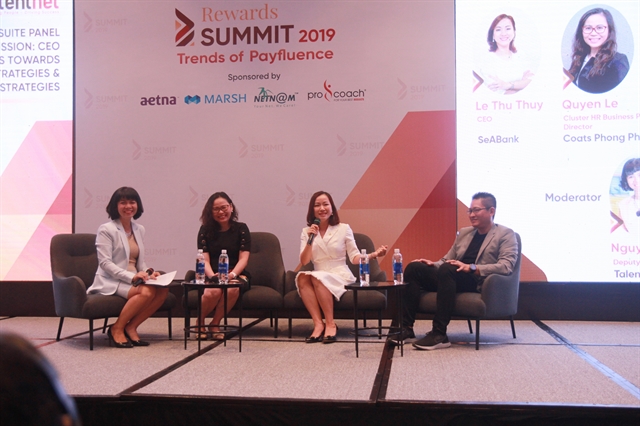 Economy
Economy

How to create a reward strategy that could attract and retain talent and how to align it with the business strategy and organisation values in the industry 4.0 era were on the agenda of the first Vietnam Rewards Summit in HCM City yesterday.

|
| A panel discussion at the 2019 Vietnam Rewards Summit under the theme “Trends of Payfluence” held by Talentnet Corporation in HCM City on October 8. — VNS Photo |
HCM CITY — How to create a reward strategy that could attract and retain talent and how to align it with the business strategy and organisation values in the industry 4.0 era were on the agenda of the first Vietnam Rewards Summit in HCM City yesterday.
Delegates said industry 4.0 technology brings businesses opportunities but also challenges, requiring them to adjust their operation processes and business strategies based on evolving requirements.
“But no matter how far technology develops, the emotional factor is always an important foundation,” Lê Thu Thủy, CEO of SeaBank, said.
Human resources are always a top priority, and how to align the human resources strategy with business strategies to leverage business growth is a concern in the digital age, according to Thủy.
Speaking about her experience in building an efficient rewards strategy, she said positioning the corporate culture and enabling an innovative growth mindset in every employee were very important.
The culture is the "soul" of every business, and stems from every employee in that organisation, and HR and the CEO's mission is to create a working environment and build a corporate culture where every employee feels happy, respected and listened to and is given the opportunity to develop to their fullest potential, according to Thủy.
Quyên Lê, cluster HR business partner director, Coats Phong Phú, said HR strategists needed to understand their organisation's business strategies and priorities, and understand the demand and desires of their existing and future employees and their priorities, thereby developing a rewards strategy that harmonises both companies and employees’ top priorities.
She said the remuneration policy must be consistent and connected with the organisation's core values, and have a positive impact on the business strategy.
Secondly, the remuneration strategy should be competitive, fair and flexible, along with transparent and open communication with employees, she said.
In addition, the effective use of rewards funds, constant updating of the market benchmark and improving remuneration strategies to meet employees’ needs were also indispensable in building a smart remuneration framework, delegates said.
Many people think an attractive salary would attract and keep talent, but it was not enough, Nguyễn Thị Quỳnh Phương, director of executive search and selection at Talentnet, said.
"Besides the salary, factors like bonus, rewards, opportunity to grow their career in the company, and the company having a positive impact on society and the environment are also very important to attract and retain talent, especially young people," she added.
Remuneration survey
The event also saw the release of Talentnet – Mercer’s remuneration survey report results covering data from 16 industries and 543 multinationals and 62 large local companies with over 342,000 employees.
The report covers salary increases, common allowances, bonuses, employee turnover rates, and other data.
It found that the salary increase in 2019 was 8.6 per cent at multinational companies and 8.9 per cent at local businesses, higher than Việt Nam’s inflation and GDP growth rates.
Technology, chemical and trading were the sectors with the highest salary increases of 10.2 per cent, 9 per cent and 8.6 per cent.
Oil and mining, education and financial services-banking reported the lowest increases of 4.5 per cent, 6.6 per cent and 6.9 per cent.
In terms of bonuses, non-banking financial services and insurance topped with 30.4 per cent and 22.9 per cent of the annual base salary.
There was a remarkable increase in the bonuses paid in the agricultural sector (19.4 per cent).
Logistics, retail and education had the lowest bonus rates of 13.8 per cent, 14.8 per cent and 15.4 per cent.
The 2019 Vietnam Rewards Summit, organised by Talentnet Corporation, attracted over 600 local and foreign business leaders and HR professionals. — VNS




